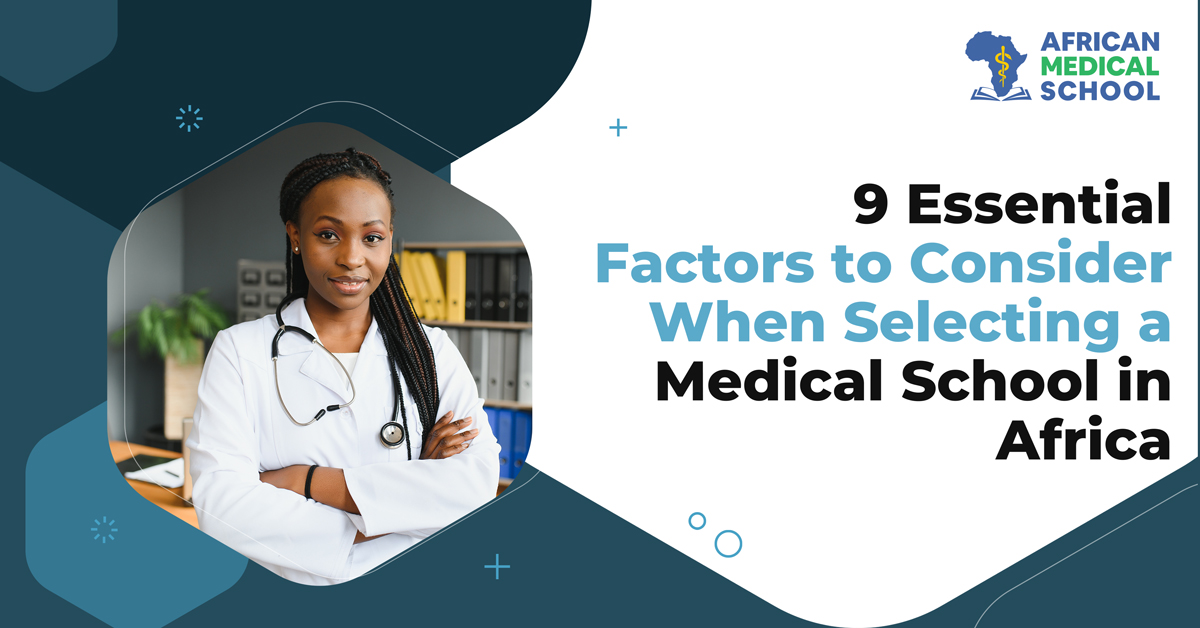|
|
Blog Summary
- 1. Accreditation and Recognition
- 2. Curriculum and Teaching Methods
- 3. Clinical Training Opportunities
- 4. Faculty Qualifications and Experience
- 5. Research Opportunities
- 6. Facilities and Resources
- 7. Student Support Services
- 8. Location and Campus Environment
- 9. Affordability and Scholarships
- Conclusion
- FAQs (Frequently Asked Questions)
Medical education is crucial in a student’s journey to becoming a healthcare professional. Choosing the right medical school is a significant decision that can shape your future career. When considering medical schools in Africa, there are several essential factors to keep in mind to ensure you make an informed choice.
Selecting a medical school in Africa requires careful consideration of various factors contributing to the quality of education, clinical exposure, and overall learning experience. Choosing a reputable institution that can provide a solid foundation for your medical career is essential. We will explore nine key factors when selecting a medical school in Africa.
1. Accreditation and Recognition
Accreditation and recognition are crucial factors when selecting a medical school in Africa. They play a significant role in ensuring the quality of education and the future recognition of your medical degree.
Accreditation is when an external organization evaluates and certifies that an educational institution meets specific quality standards. It assures that the medical school has undergone a rigorous assessment and has completed the established criteria set by accrediting bodies. Accreditation is an essential indicator of a medical school’s commitment to delivering a high standard of education.
In addition to accreditation, recognition by international medical bodies is another crucial aspect to consider. International recognition indicates that the medical school’s curriculum and educational standards align with global benchmarks. It can enhance international mobility and career opportunities for graduates.
2. Curriculum and Teaching Methods
Evaluate the curriculum offered by the medical school. Look for a comprehensive curriculum that covers the fundamental medical sciences and clinical rotations. Consider the teaching methods, such as problem-based learning, case studies, and practical hands-on experiences. A well-structured and innovative curriculum can significantly enhance your learning experience.

3. Clinical Training Opportunities
Clinical training is a vital aspect of medical education. Evaluate the opportunities available for clinical rotations and internships. Consider the affiliations of the medical school with hospitals and healthcare facilities to ensure exposure to diverse patient populations and specialized fields. Consider the duration and intensity of clinical rotations and internships. The more extensive and immersive the clinical training program, the better prepared you will be for the demands of a medical career. Look for medical schools prioritizing hands-on learning and offering ample opportunities for direct patient care, diagnostic procedures, and medical interventions.
Some of the best medical universities in Africa offer excellent clinical training opportunities. These universities have strong affiliations with hospitals and healthcare facilities, and they offer a wide range of clinical rotations and internships. Students at these universities have the opportunity to work with diverse patient populations and gain experience in a variety of specialized fields.
4. Faculty Qualifications and Experience
The qualifications and experience of the faculty members in a medical school are crucial factors to consider when selecting an institution. Highly qualified and experienced faculty can significantly enhance the quality of education and provide valuable guidance and mentorship to students. When researching a medical school in Africa, look for faculty members with advanced degrees in their respective fields, such as MDs, PhDs, or specialized certifications.
Their expertise and guidance contribute to the overall learning experience and play a significant role in shaping the future success of medical students.
5. Research Opportunities
Engaging in research allows students to delve deeper into medical sciences, contribute to advancements in healthcare, and develop critical thinking and analytical skills. When evaluating medical schools, look for institutions that actively support and encourage student involvement in research projects. It can include dedicated research programs, collaborations with research institutes, and opportunities for students to participate in ongoing studies.
6. Facilities and Resources
Adequate and well-equipped facilities provide a comprehensive learning environment and enable students to gain practical skills. Look for medical schools with modern classrooms, well-equipped laboratories, and up-to-date medical equipment. These resources are essential for hands-on learning, conducting experiments, and practicing clinical procedures. Additionally, consider the availability of digital resources, online databases, and medical journals that can support your studies.
7. Student Support Services
Medical school can be academically and emotionally challenging, and having complete support services can make a significant difference in a student’s experience. Look for institutions that offer a range of student support services, including academic counseling, mentoring programs, mental health support, and career guidance.
Access to comprehensive student support services ensures students have the resources and support they need to thrive academically, emotionally, and professionally during their medical school journey.
8. Location and Campus Environment
A medical school’s location and campus environment in Africa is essential to consider, as they can significantly impact your overall experience. Look for a campus that provides a safe and conducive learning environment with comfortable study spaces, libraries, and recreational facilities. A well-designed and vibrant campus can contribute to a positive and enriching educational experience, fostering student collaboration, interaction, and a sense of community.

Furthermore, consider the cultural and social aspects of the location. Selecting a medical school in a place and campus environment that aligns with your preferences and supports your personal and educational goals will contribute to a fulfilling and well-rounded medical education. By selecting a medical school in one of the best countries for studying medicine in Africa, you can ensure that you receive a high-quality education in a supportive and enriching campus environment.
9. Affordability and Scholarships
Pursuing a medical education can be financially demanding, and choosing a school that aligns with your budget and offers financial assistance options is essential. Research the tuition, fees, and living expenses of attending medical school. Explore the availability of scholarships, grants, and financial aid options.
Scholarships can significantly alleviate the financial burden of medical education, so look for schools that offer scholarships specifically for medical students. Additionally, consider the eligibility criteria and scholarship application process to determine if you meet the requirements.
Conclusion
Selecting the right medical school in Africa is a significant step towards achieving your dream of becoming a healthcare professional. It’s essential to thoroughly assess the decision you’re about to make since it will have a significant bearing on your academic journey and potential career prospects. By thoroughly evaluating factors such as accreditation, curriculum, clinical training, faculty qualifications, research opportunities, facilities, student support services, location, affordability, and scholarships, you can make a well-informed choice that suits your needs and aspirations. You can embark on a successful and fulfilling medical career in Africa.



11 Comments. Leave new
JLJL99App, heard some buzz about this one. Apparently, the app has some cool features and exclusive games. Gonna give it a download and see what all the hype is about. Could be the next go-to app for my gaming sessions. You should try it too!: jljl99app
Yo, check it out! Found 777casinonl. Looks like a fun little spot for some online gambling. Ready to win? Join 777casinonl.
Thanks for sharing. I read many of your blog posts, cool, your blog is very good.
Cho dù bạn là một khách chơi mới hoặc đã chơi lâu năm, hệ thống game của 888slot bet luôn đáp ứng được nhu cầu của từng người chơi. Tham gia vào những trò chơi hấp dẫn, bạn sẽ có cơ hội giải trí, thư giãn và đặc biệt là có thể gặt hái được những chiến thắng lớn nếu may mắn đứng về phía mình. TONY12-24
Your article helped me a lot, is there any more related content? Thanks!
Opa! Me falaram da Stakerbet, e parece que tão dando uns bônus maneiros. Será que vale a pena se cadastrar? Alguém aí já testou a plataforma deles? Dá uma olhada aqui: stakerbet
Alright, checked out gembetapp. Easy to use and everything seems in its place, worth a quick look. Check it out at gembetapp
Hey all, anyone checking out gà chọi c1.com trực tiếp? Let me know what you think! Always on the lookout for the best places to watch.
**mitolyn**
Mitolyn is a carefully developed, plant-based formula created to help support metabolic efficiency and encourage healthy, lasting weight management.
I don’t think the title of your article matches the content lol. Just kidding, mainly because I had some doubts after reading the article. https://www.binance.com/cs/register?ref=OMM3XK51
Your article helped me a lot, is there any more related content? Thanks! https://www.binance.info/register?ref=IXBIAFVY